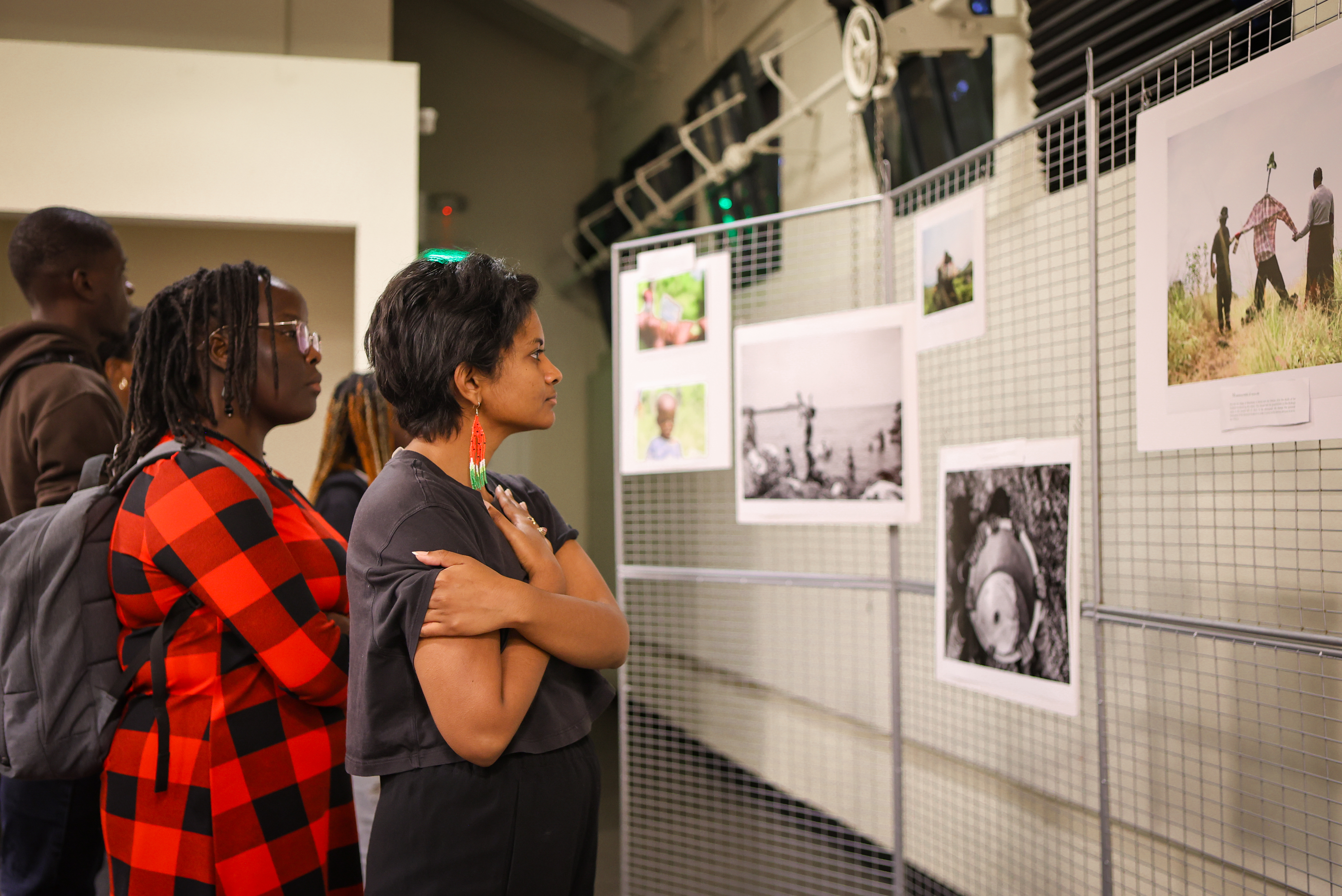Content warning: This article contains references to sexual assault and gender-based violence.
Students illuminated the resilience, strength and humanity of Congolese women affected by decades of ongoing conflict, sexual violence and industrial mining in the Democratic Republic of Congo (DRC) in Roble Arts Gym on Wednesday evening, marking the third event of Stanford’s inaugural Congo Week.
The space featured a photo exhibit of images captured by the Mamas, 50 internally displaced women from the Bulengo displacement camp in Eastern DRC. The women have been forced to flee their homes due to what the United Nations describes as the deadliest conflict of the 21st century.
“This event is really a celebration of the women in the displacement camps who are representing their own spaces and creating their own narrative,” said Dena Montague, an environmental justice lecturer who has conducted research on the Congo for over three decades.
The photos were created through a project sponsored by the Friends of the Congo, Yole!Africa and the Basandja Coalition, an Indigenous union of approximately 10,000 artisanal miners from the Congo Basin forest. Petna Ndaliko Katondolo, a Congolese filmmaker and activist, curated the project. A book titled “Mahindule” will also be published soon exploring the photography project and the dynamics of memory, trauma and family displacement.
The coalition provided cameras to the women “rather than guns” to heal from their trauma, said Fatoumata Barrie ’24 M.A. ’25, lead organizer of Congo Week. The project aims to facilitate emotional and psycho-social rehabilitation for Congolese women through artistic expression.
Barrie, who uses photography to process the grief of losing her own mother, emphasized the potency of visual storytelling in the recovery process.
“Seeing these pictures, hearing from the Congolese people, you will see just how human they are,” Barrie said. “We miss out on so much by being silent about what they are going through, and not tapping into that connection that could be so beautiful and a wonderful exchange.”

Jackline Wanza Wambua ’25, who is a member of student leadership at the Stanford African Students Association (SASA) and organizer of Congo Week, shared her experiences speaking with Congolese women in displacement camps in Goma, the capital of the North Kivu province in the eastern region of DRC, this past summer.
Wambua said that she was driven by a “desire to experience the truth firsthand” to visit Eastern DRC after years of reposting stories about the struggles faced by Congolese people on social media. She described wanting to gain a nuanced, multidimensional portrait of the suffering in the internally displaced person (IDP) camps.
“I was determined to move beyond passivity and take action,” said Wambua, who grew up in Kenya. “As a development economist, I wanted to see the realities on the ground. I like solving problems dealing with poverty, and so I wanted to go in and investigate these questions.”
Wambua described the dire conditions in the IDP camps in Goma, including poor sanitation, malaria and limited access to food and clean water. She said that she never saw a child attend school in the camps.
Rampant sexual violence has also been extensively documented in Goma’s IDP camps, Wambua said. Barrie also said that Congolese women are “disowned” and “unable to return home” with their children after instances of rape or sexual violence, forcing them to seek refuge in displacement camps and take care of each other. However, Wambua and Barrie noted that the women face threats of violence and attacks from militant groups within the camps.
“I am very interested in how humanitarian organizations work… and why action is not being done to help the [victims] of sexual violence,” Wambua said. “Most of these women are sometimes raped by the military in the name of peacekeeping. Instead of guns being used to protect them, sometimes the guns are used to make them subdued to being raped. Sometimes you meet a woman who has been raped several times, and nothing has been done to help them.”
Wambua highlighted the detrimental impact of mismatched aid, noting the disconnect between the type of donations given and what is needed by the refugees. “I wanted to know when we donate money to different platforms, where does this money go and who does it impact?”
Attendee Benita Kisembo ’25 echoed Wambua’s statement regarding aid-giving and donations, emphasizing the need for “people at Stanford [to] gain insight into how to be ethical givers and ethical members of the international community.”
She urged international aid to be structured more efficiently to meet the needs of displaced Congolese people, while also encouraging audience members to consider their role as individuals.
“Consider how your own skills, how your own talents, how your own knowledge can be effectively used to meet the needs of the Congolese people,” Wambua said. “When you mobilize as an individual, you get people to collaborate with you. I wanted to visit DRC, and Asukulu,” a Congolese Stanford senior, “said he was going… There are always people to support our journeys.”
Correction: A previous version of this article misstated Wambua’s role at SASA. The Daily regrets this error.
